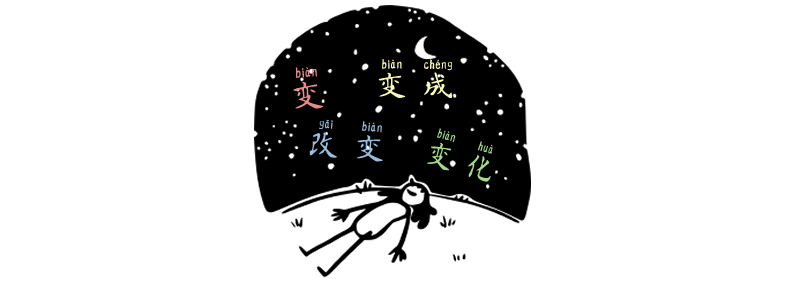There are four different ways to talk about change in Chinese, each with its own nuance: 变 biàn, 改变 gǎibiàn, 变化 biànhuà, and 变成 biànchéng. Each of these terms has its own unique nuance, and understanding these subtleties can help you use them more accurately.
Let’s have a small quiz. Do you know which one is correct?
A – 最近的生活有很大的變化最近的生活有很大的变化
B – 天氣變成冷了天气变成冷了
C – 我變我的想法我变我的想法
D – 你改變得胖了你改变得胖了
变 biàn (Verb)
变 biàn + (得 de + Adv.) + Adj
東西都變貴了东西都变贵了
Things have become more expensive.
我覺得明天天氣會變冷我觉得明天天气会变冷
I think the weather will get colder tomorrow.
你變得好高啊你变得好高啊
You’ve gotten so tall!
中文變得越來越難了中文变得越来越难了
Chinese is getting harder and harder.
变成 biànchéng (Verb)
变成 biànchéng is a verb that needs to be followed by a noun. In English, it’s translated as “change into” rather than just “change.”
变成 biànchéng + Noun
自從他在台灣住了5年後,好像變成了另外一個人自从他在台湾住了5年后,好像变成了另外一个人
Ever since he lived in Taiwan for five years, it seems like he’s become a completely different person.
10年的努力讓他從職員變成了老闆10年的努力让他从职员变成了老板
Ten years of hard work turned him from an employee into a boss.
聽說要變成一位台灣公民非常困難听说要变成一位台湾公民非常困难
I’ve heard it’s very difficult to become a Taiwanese citizen.
我要把你變成我女朋友我要把你变成我女朋友
I’m going to make you my girlfriend.
变化 biànhuà (Noun)
這麼久沒見了,你覺得他有什麼變化嗎?这么久没见了,你觉得他有什么变化吗?
It’s been so long since we’ve seen him, do you think he’s changed?
很多人對中國人的印象產生了變化很多人对中国人的印象产生了变化
Many people’s impressions of Chinese people have changed.
這些調味料會為料理帶來很大的變化这些调味料会为料理带来很大的变化
These seasonings will bring a lot of variation to the dish.
這件事情已經決定了,我不希望有任何的變化这件事情已经决定了,我不希望有任何的变化
This matter has been decided, and I don’t want any changes.
For Advance Learners:
变化 biànhuà can also function as a verb, and it’s a more formal term. It conveys the idea of transformation, focusing on the process of change itself. So, if the direction of the change is clear, we usually use “变 biàn.” However, if the direction is unclear or we want to emphasize the ongoing nature of the change, we use “变化 biànhuà” to highlight that process.
For example, in the sentence “天气变暖以后我们去野餐” (We’ll go picnic after the weather warms up), it means we’ll only go picnic once the weather has already changed. On the other hand, “这些天天气变化很快” (The weather changes quickly these days) emphasizes the rapid changes in the weather itself.
改变 gǎibiàn (Verb and Noun)
改变 gǎibiàn focuses on the clear differences before and after a change. It’s often intentional and can result in something getting better or worse, but the change is always noticeable.
改变 gǎibiàn as verb + Noun
Noun + 改变 gǎibiàn as verb (Used more often)
你需要改變你的學習態度你需要改变你的学习态度
You need to change your attitude toward studying.
你的學習態度真的需要改變你的学习态度真的需要改变
You really need to change your attitude toward learning.
他常常改變主意他常常改变主意
He often changes his mind.
雖然你的身份改變了,但是你的生活沒有改變虽然你的身份改变了,但是你的生活没有改变
Even though your status has changed, your life hasn’t.
說過的話是不可以改變的说过的话是不可以改变的
Words that have been spoken cannot be changed.
這幾年人們對於同性戀的想法有了很大的改變这几年人们对于同性恋的想法有了很大的改变
n recent years, people’s views on homosexuality have changed significantly.
Summary
变 biàn: It’s a verb that means “change” or “become” and is typically followed by an adjective.
变化 biànhuà: It’s a noun that means “change,” emphasizing the process or result of gradual changes.
变成 biànchéng: It’s a verb that means “change into” or “turn into” and is always followed by a noun.
改变 gǎibiàn: It’s both a verb and a noun meaning “change.” It emphasizes a deliberate or intentional alteration. When used as a verb, it is typically followed by a noun, or the noun can be placed at the beginning as the topic.


